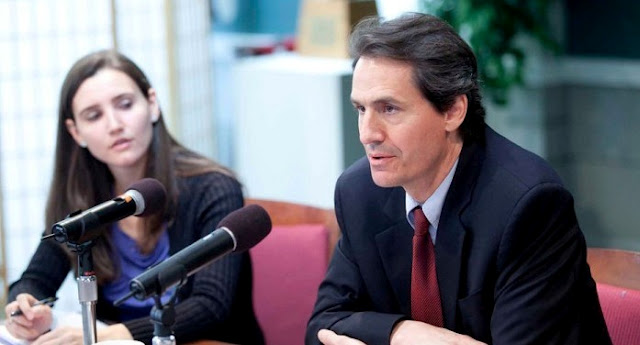The
work of photographer Jonas Bendicksen provided the inspiration for a research paper competition organized by the Woodrow Wilson Center’s
Comparative Urban Studies Project, the
Cities Alliance, the
International Housing Coalition,
USAID, and the
World Bank. At “The Places We Live: Slums and Urban Poverty in the Developing World,” four of the winning papers (out of 200 entries) were critiqued by urbanization policy experts. The authors focused on
critical issues facing the world’s rapidly urbanizing centers, including service delivery, the challenge of political cleavages, redevelopment mechanisms, sanitation, and citizen participation in urban development.
The competition was established to “tap into the academic community and encourage … a younger generation of academics…to think about the challenges of rapid urbanization and the needs of slum dwellers and what we can do about it,” said USAID’s Jessica Tulodo. “It is the central issue that we are going to be grappling with for the coming decades and beyond. How do we not just address the challenges, but harness the opportunities of urban growth and how do we ensure that the larger population of urban poor can benefit and participate?”
“This is an effort to rekindle a stronger debate between the academic community and policymakers. I think that’s desperately absent, particularly in this field,” said Christopher Williams, the U.S. Representative of UN-HABITAT.
All Politics Are Local: Urban Services in Zambia
In her case study of the shanty compounds on the periphery of Lusaka, Zambia, Danielle Resnick investigates how the ruling government — through “development initiatives” — suppresses political opposition and controls weaker economic and political factions. The difficult relationship between local service delivery and inter-party politics is endemic in many African countries, where local municipalities are often run by opposition parties.
Christopher Williams, in his review, praised Resnick’s work for capturing the intricacies and complexity of rapid urbanization in Zambia and beyond, noting that it offered a “scathing” critique of direct budget assistance by foreign donors.
“Land Sharing”: A New Approach for Slums in Southeast Asia
Paul Rabe’s “Land Sharing in Phnom Penh and Bangkok: Lessons From Four Decades of Innovative Slum Redevelopment Projects in Two Southeast Asian ‘Boom Towns'” examines the emerging issue of land conflict in redeveloping urban areas and innovative solutions such as land sharing. Sometimes called a “win-win-win,” land sharing through multi-use agreements based on maximized utility can help to mediate the needs of slum dwellers, private developers, and municipal governments.
Rabe found that land sharing has several limitations, including programmatic delays, muted benefits for stakeholders, and limited deployments. “In retrospect,” he said, “the institutional setting [for land sharing] is not mature enough to accommodate a fairly complex redevelopment procedure.”
If donors and civil society groups are willing to brave a complex and highly politicized environment, land sharing may be an innovative option for those looking to quell redevelopment conflict. Robin Rajack of the World Bank said it was critical for the future sustainability of growing urbanization, as improving the ability of the urban poor to navigate difficult land tenure changes may foster urban economic growth.
Maintaining Sanitation, Building Community in India
In “Desired Outcomes, Unexpected Processes: Two Stories of Sanitation Maintenance in Erode Tenements, India,” Sai Balakrishnan asks why, “within the same municipality, are residents of some tenements more willing to contribute towards septic tank maintenance than others?” Her analysis of two communities in the state of Tamil Nadu in Southern India finds that asset ownership, embedded and accessible politicians, and political patronage did not improve maintenance of sanitation infrastructure. Instead, the critical factors were the spatial proximity of infrastructure, bundling of water and sanitation services, and “street-level bureaucrats.”
Reviewer Bob Buckley of the Rockefeller Foundation asked if future research could incorporate empirical data on the costs of sanitation problems for communities, “beyond the visuals,” which could provide a deeper understanding of the difficulty of delivering services in urban slums.
Gaming Community Participation in Argentina
Josh Lerner’s “What Games Can Teach Us about Community Participation: Participatory Urban Development in Rosario’s Villas” reveals the results of his six months of fieldwork in the slums of Rosario, Argentina. Although urban redevelopment can produce conflict–especially when combined with vast inequities in economic and political power–Lerner found that taking a game theory approach to difficult land-use decisions helped to “enhance the quality of community participation, by making it more attractive, active, and effective, and making decisions fairer and more transparent.”
William Corbett of Cities Alliance warned that if developing countries cannot effectively deal with the chaotic informality of land tenure and urban development, “gangs with guns will do it for you”– particularly when urban change and resource or land scarcity provokes competition for limited resources.
Photo Credits: “Christopher Williams, Danielle Resnick; Moynahan Boardroom” courtesy of David Hawxhurst.
 A Publication of the Stimson Center.
A Publication of the Stimson Center.




